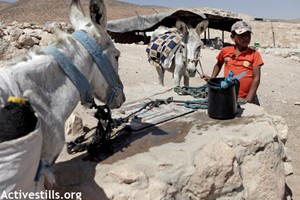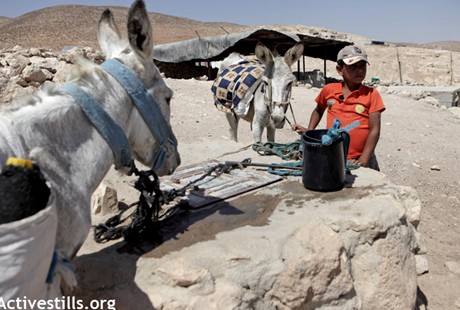
Following the State’s foot dragging on responding to a petition against the forced evacuation of a thousand residents of Masafer-Yatta (Firing Zone 918), Deputy Supreme Court President Miriam Naor expressed displeasure with the State Attorney’s conduct and delayed the July 15 hearing on the petition.
Deputy Supreme Court President Naor, in a long and detailed decision, criticized the State Attorney for failing to abide by proper civil procedure in its response to petitions against the forced evacuation of the residents of Masafer-Yatta in the South Hebron Hills (commonly referred to as “Firing Zone 918”). Justice Naor cancelled the scheduled hearing set for July 15, ordered the state to file its final response by July 12, and asked the clerk to set a new hearing date immediately after the Court’s summer recess.

Jinba: “Illegal dwelling in a fire zone.” (Photo: Activestills)
In January of this year the Association of Civil Rights in Israel (ACRI) filed an updated petition against the forced evacuation of residents of villages in an area declared by the army as “Firing Zone 918.” The court immediately restrained the state from expelling the residents until a decision in the case was reached, and gave it 60 days to file a response. In March, the state filed a preliminary response that did not address the merits of the petition, declaring that it was undertaking the necessary examinations of the petitioners’ factual and legal claims, and that it would file a full response within 90 days.
Ninety days later, the state had still failed to file its answer – the state had essentially taken an extension without leave of the court, and then failed to abide by it. In response to an inquiry from ACRI, the State Attorney claimed it is authorized to file its response up to 3 days before the hearing (which was scheduled for July 15). Concerned that this would not leave the petitioners enough time to prepare for the hearing, ACRI filed a motion to order the State Attorney to file its full response to the petition by July 7. Justice Naor issued her order in response to ACRI’s motion.
The area designated by the IDF as “Firing Zone 918” is located in the South Hebron Hills near the town of Yatta. Spread over 30,000 dunams and home to some 1,300 people, it includes twelve Palestinian villages, or hamlets: Tuba, Mufaqara, Sfai, Majaz, Tabban, Fakheit, Megheir Al-Abeid, Halaweh, Mirkez, Jinba, Halat a-Dab’a and Sarura. Eight of these villages, with around 1,000 residents, currently face eviction. The villagers maintain a unique way of life, with many living in or beside caves, and relying on farming and husbandry of sheep and goats for their livelihood. Most of them were born and raised in these villages to families that have been living in the area for several decades – long before 1967. In August and November 1999 the majority of the inhabitants of the twelve hamlets were served with immediate evacuation orders due to their “illegal dwelling in a fire zone.” In late 1999, security forces arrived and evacuated over 700 residents by force. The IDF destroyed homes and cisterns and confiscated property. The villagers, dispossessed of their lands and their livelihoods, were left homeless.
Since then, ACRI has launched numerous petitions to prevent the forced eviction of the villagers and destruction of their property. ACRI Attorney Tamar Feldman, commented after filing the most recent petition: “It is inconceivable that 1,000 people should be evicted for the sake of military exercises. These evictions, which are tantamount to forced displacement, deny the villagers their livelihood and seize the property of people whose very existence depends upon the land they cultivate. Not only is this an extreme violation of international law, but it is tantamount to extreme cruelty.”
Related:
Israeli writers visit south Hebron hills to prevent expulsion of Palestinians
Palestinian villagers take IDF to high court over military drills


